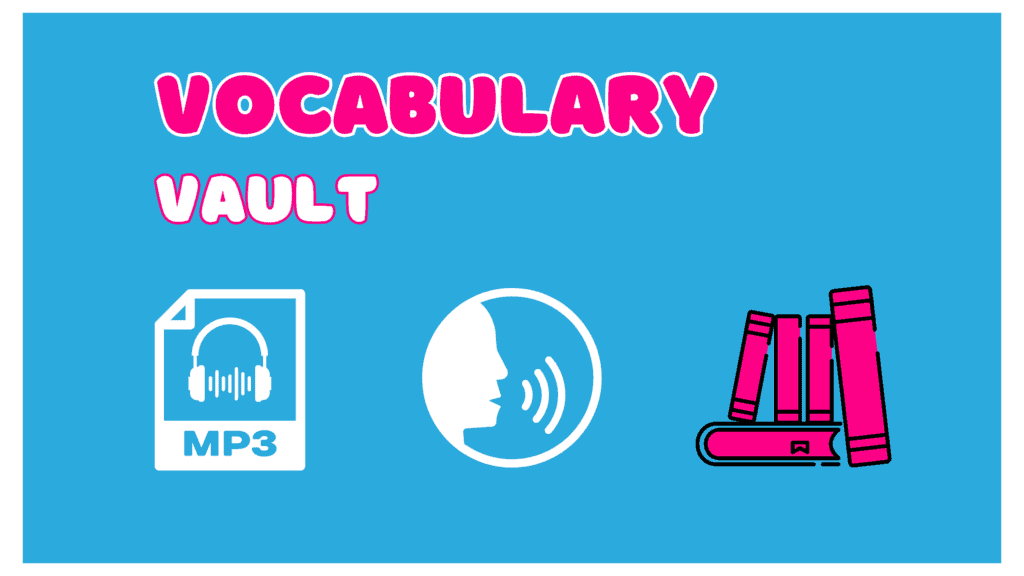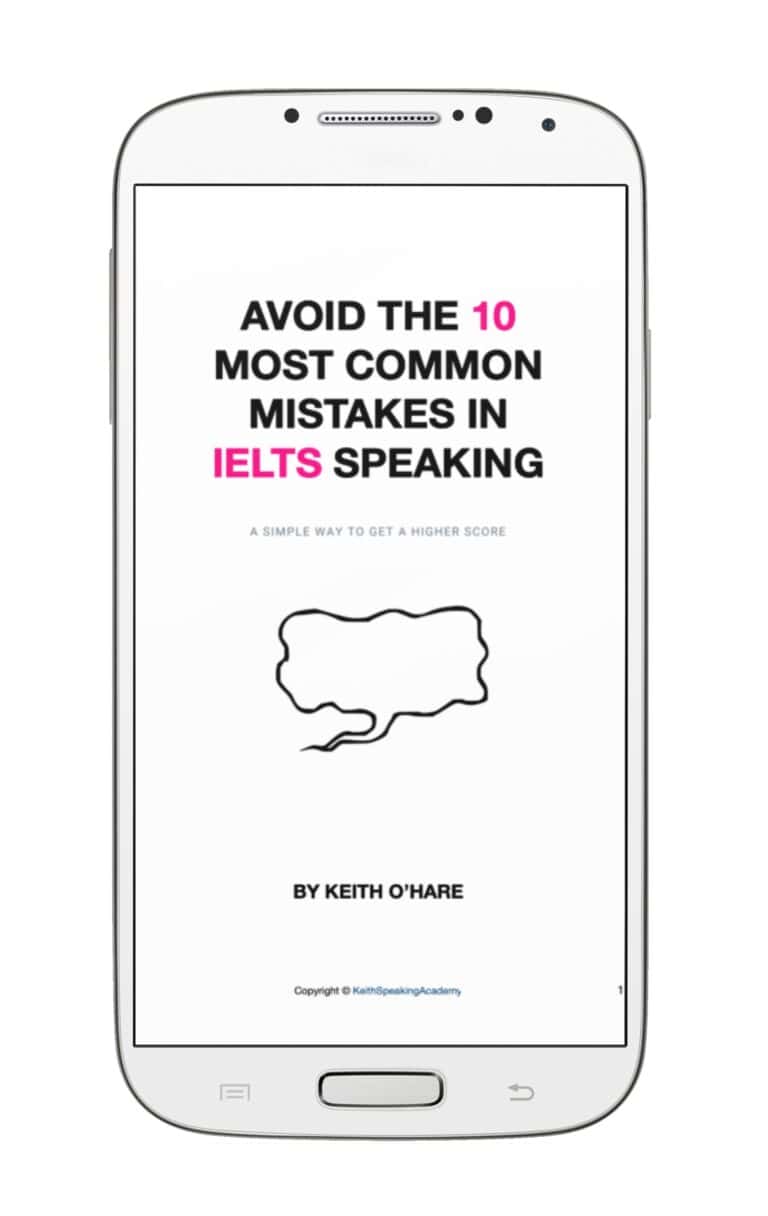IELTS Speaking Lesson about Work
👇 Take this lesson with you! 👇
Table of Contents
IELTS Speaking vocabulary: Work
Warm up!
Fill in th gap with one word
- He works ____ a chef
- He is responsible ______ keeping the kitchen clean
- I don’t work, I’m a _____
- He works as a chef
- He is responsible for keeping the kitchen clean
- I don’t work, I’m a student /homemaker / stay-at-home mum or dad
IELTS Speaking: Do you work or are you a student?
At the beginning of the IELTS speaking test, you will be asked your name, and then the following question:
Do you work or are you a student?
- If you have a job, tell the examiner you work and talk about your job.
- If you are a student, at school, university, or doing part-time study (like preparing for IELTS), you can say so and talk a little about the subject you study.
In this lesson we will look at what to say if you work (outside or inside the home), and the how to answer the typical follow up questions you may get in Part 1 of IELTS Speaking
What do you do (for a living)?
- I work in a / an ____ [place]
I work in a bank / a school / a hospital
- I work in ______ [field/industry/area]
I work in finance / education / health care
- I work as a / an _____ [job/profession]
I work as a banker / a teacher / nurse
- I’m a / an ______ [job/profession]
I’m a banker / a teacher / nurse

Templates and Sentence Stress
Here are some simple templates to use.
Remember you need to stress the nouns and verbs in particular. This will help you sound more natural.
When practicing, stress these words (underlined below) more than usual: Exaggerate!
I work as a _____
I’ve been doing this job for _____ years / months and I _____ it.
I work as a teacher
I’ve been doing thisjob for 20 odd years and I love it.
I work as a teacher
I’ve been doing this job for around 20 years and I kind of like it.
Other ways of saying you like it just a little.
- I don’t mind it
- It pays the rent
- It’s not bad
I work as a _____ and I help people ______
I work as a teacher and I help people learn English and build their confidence in speaking
IELTS Speaking: Part 1 Work questions
Why do you do that job?
- It’s rewarding / challenging
- I get to __(do something) __
- What I really like about my job is _____
I get to meet lots of interesting people, and help them become confident communicators
What I really like about my job is meeting lots of interesting people, and help them become confident communicators
What responsibilities do you have?
- I have to look after sick people
- I’m responsible for lookING after patients
- It’s up to me to make sure the correct medicine is given.
- My main duties are giving medicine, caring for patients, checking the correct dosage
Future job
- I wouldn’t mind being a fire fighter
- I’d love to be a doctor
Discover more interesting ways of answering ‘What do you do?’
Listening task
1. Listen to someone talk about their work. Can you guess their job?
2. Watch again and try to fill in these gaps
I work as a [1] ________I’ve been doing this job for around 10 years and I [2] _______ it.
I help people create spaces where they feel comfortable and happy with their friends.
Yes, it’s [3] ________ and I have to coordinate with the client and other workers on site, but I get to [4] _______ my creativity.
Problems always pop up in the implementation stage, and it’s up to me to make sure solutions are found and of course I am responsible for making sure [5] ______ are met.
See answers
I work as a [1] builder. I’ve been doing this job for around 10 years and I [2] love it.
So, I help people create spaces where they feel comfortable and happy with their friends and family
Yes, it’s [3] challenging and I have to coordinate with the client and other workers on site, but I get to [4] unleash (=release) my creativity.
Problems always pop up/appear in the implementation stage, and it’s up to me to make sure solutions are found and of course I am responsible for making sure [5] deadlines are met.
3. Watch to see the answers
What if you don’t work (outside the home)?
What if you don’t work outside the home?
So maybe you look after the family, or you might be unemployed or even retired.
Here are some useful phrases you can use.
- I am unemployed (this is a bit negative)
- I’m between jobs (this is more positive)
- I’m looking for a job
- I’m job hunting
- I am a job seeker
- I’m transitioning careers
- I am not working at the moment
I am taking time off work
I’m taking a gap year (this is where recently graduated students take time off the travel before finding a job)
I’m taking a sabbatical (a rest or break from work, usually one year) I’m on sabbatical at the moment
Actually I’m retired, so I no longer work. I used to…
The following are different ways to say you work at home looking after the home and family.
I’m a home maker
I’m a stay-at-home mum / dad
I’m a housewife
I’m a househusband
- I take care of the housework, look after the kids and what not (=and so on)
- I do the school run (=take the kids to school)
- It’s up to me to do the weekly shop and prepare the meals.
- I handle family finances / the cooking / the washing
- I do some part-time work
- I have to be a multi-tasking genius!

IELTS topic: How the job market has changed
Useful Collocations (in bold)
- More workplace flexibility
- Many companies have flexitime
- Remote working
- Working from home
- The gig economy has grown (this includes freelancers and consultants)
- Increase in online working means a growing demand for more technical skills
- Zero-hour contracts are more commonplace (=a contract where the employer does not guarantee a minimum number of hours work)
- A shift towards e-commerce means fewer shop assistants and more warehouse workers
- Rises in the minimum wage
- Less job security
- The unemployment rate has risen
- More people do part-time work
IELTS Speaking: Idioms about Work
- To suit someone down to the ground = To be perfect for someone
This job suits me down to the ground
- To never do a stroke of work = to be lazy and do the least work possible
She is so lazy, she never does a stroke of work
- To pull your weight = to do your fair share of work
We always complain about him because he doesn’t pull his weight
- To hit a glass ceiling = To reach an invisible barrier stopping someone from rising up in a company
A glass ceiling stops many women from advancing in many industries
If someone asks you to do a difficult task you can say,
- It’s a tall order
- It’s a big ask
Expressions to say I am very busy
- I have a lot on my plate
- I am snowed under with work
- I am bogged down with work
- I am swamped with work
- I am up to my neck/ears in work

Pronunciation Files For Vocabulary From My Best Live Lessons
Use Words EASILY in English Conversations!
More Free Lessons
If you liked this lesson, leave a comment below!
There are more lessons you can follow in the links below too.
SHOPPING in IELTS Speaking. Learn the essential vocabulary for this topic, as well as how to talk about online shopping.
STUDYING in IELTS Speaking. Learn the essential vocabulary for this topic, as well as how to talk about studying techniques.
HOLIDAYS in IELTS Speaking. Discover the 10 things the British do on holiday and learn the useful vocabulary and idioms to talk about it.
AMBITION in IELTS Speaking. Vocabulary and ideas to talk about ambitions, as well as some model answers.


